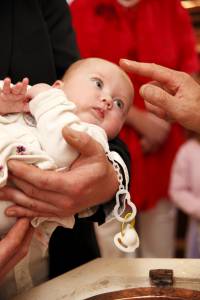There are a number of scriptures in the Bible that discuss baptism. John the Baptist actually baptized Jesus, even though he believed he was unworthy to perform the ritual for Christ. In many Christian churches, baptism is one of the sacraments. It’s taken very seriously, even though it is a very joyous occasion.
Believers are taught Matthew 28: 19-20:
“Therefore go and make disciples of all nations, baptizing them in the name of the Father and of the Son and of the Holy Spirit, and teaching them to obey everything I have commanded you. And surely I am with you always, to the very end of the age.”
In Matthew 3:11, John the Baptist says, “I baptize you with water for repentance.” He was referring to the people who came to him to be baptized. It’s never really explained in the Bible why people would believe that water baptism would be symbolic of repentance. In order to fully understand why John the Baptist’s followers would believe that this baptism would prepare the Jews for the Messiah, we have to go back to the Old Testament and the Law.
Jewish Traditions
Jews were given laws about ritual washing, which was called a mikvah. Both women and men were required to submerse their bodies in water to purify it before Holy Days or the Sabbath. Women were commanded to immerse their body following menstruation. In Orthodox communities, people even submerse kitchen utensils and cookware in the mikvah before use.
The Jews were told to use a natural spring or cistern for the mikvah. Oceans and rivers were also acceptable. When John the Baptist began baptizing the Jews, this was understood as part of their heritage. It’s very probable that the mikvah was the precursor to the Christian baptism sacrament.
Christians & Water as a Purifier
Water is one of the necessities of life. An individual might go up to three or four weeks without food, but only about two to three days without water before becoming very ill. It is essential to every system in the body. Water is required for healing, calming and soothing. In the desert of Israel, it would have been even more important than most of us in America could appreciate.
In many religions, water is considered a purifier and is sacred. The Hindus believe that water is spiritually cleansing. A morning cleansing bath is obligatory. Many temples have cisterns where believers can take baths before entering. Muslims, too, have ritual immersion rites to purify their body before approaching God in prayer. In the Buddhist culture, water is important to the funeral ceremony. The water takes the soul from the body and returns it to the earth.
Water in Christianity
Most Christians remember the story of Noah and the flood. God covered the earth in water as a purification rite. You should note that Christians are not the only ones with a flood story. Many other cultures around the world, from South America to Asia, have stories about a great flood as part of their creation story.
Water features heavily throughout the Bible as a symbol of the spiritual need for God. Psalm 42 says, “As the hart panteth after the water brooks, so panteth my soul after thee, O God.”
“I am Alpha and Omega, the beginning and the end. I will give unto him that is athirst of the fountain of the water of life freely.” – Revelation 21:6
The Christian rite of baptism is an outward sign of an inward change in a person’s life. It is a celebration of a new person. Even if you don’t believe in Christianity, celebrate a loved one’s baptism with them as they take on a new direction.



